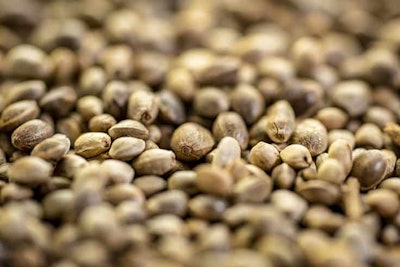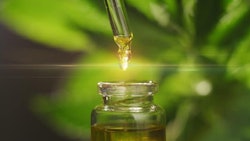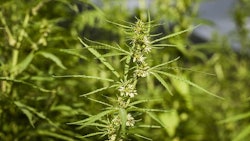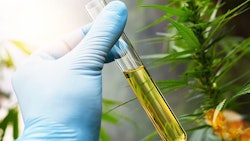
Florida farmers interested in joining the state’s newly approved industrial hemp program are quickly learning the trials involved in sourcing certified seeds. According to state law, industrial hemp seeds must be certified by an agent of the Association of Official Seed Certifying Agencies (AOSCA).
With only six years of research-based hemp cultivation on the books in the U.S. since the 2014 Farm Bill was signed, the sheer timing of this requirement has made it difficult to find a breeder who has earned AOSCA certification on his or her hemp genetics.
Enter Sunbelt Hemp, a seed production business based outside of Greenville, S.C.
The company’s Goliath variety, among others that are sold out as of mid-July 2020, has been certified by an AOSCA agent, making it a target of Florida hemp growers seeking a reliable, compliant seed source.
Ben Baum, H.F. Michell Co. representative in Florida, has been connecting growers with Sunbelt seeds. He has picked up on a lot of interest from Florida growers working within the bounds of that ASOCA requirement.
According to Baum, Goliath boasts a 99% germination rate. (AOSCA-certified seed batches must bear out germination rates of 80% or higher.) The certification backs up that claim and communicates to growers that there is a high degree of genetic reliability among every lot that a particular breeder produces.
Baum says that the breeders that Sunbelt has partnered with spent more than 40 years breeding THC varieties of cannabis in Europe. They bring that experience to the global industrial hemp market.
With Goliath, they bred for rich terpene levels that mirrored what customers might find in the THC-dominant cannabis market. Along with its CBD value and other minor cannabinoids, Baum says Goliath makes for a great smokable hemp flower. This will be the first year of Goliath production in Florida, but the seed has performed well through growth cycles in other hot, humid regions, according to Baum.
Jeff Greene, co-founder of the Florida Hemp Council, says that this has been a promising lead for farmers who are new to hemp and facing the question of how to source seeds or starts in a new industry. As the industrial hemp landscape continues to mature, the role of AOSCA will become more visible.
“The certification process on these genetics started long before Florida passed a law requiring it,” Baum says. “The reason behind getting certified was actually for the protection of the farmer. As in other agriculture crops, the AOSCA certification is there to ensure genetic purity and germination rates. … Sunbelt Hemp decided pursue certification as a way to move toward legitimizing the hemp seed supply chain.”
What precedes that legitimacy in hemp is a supply side rife with unmarked mason jars and germination rates hovering around the 50% mark.
Greene says that he’d recently sourced CBG seeds from a seller that came in at a 50% germination rate with a 30% male-to-female ratio. “Under current guidelines, that would be criminal,” he says, remarking on the Florida regulations.
This is where a third party like AOSCA can sort out the mismatched promises and results of a nascent market.
For Florida hemp growers interested in starts, plugs and clones, Greene says that the Florida regulations have become a bit clearer since the USDA first approved the state’s plan to run a hemp program this year.
The earlier rules mandated a quarantine on all starts that came into the state of Florida, a move designed to protect the integrity of the soil and to ward off unwanted pests. Now, Florida will allow starts to come into the state in rock wool, sterilized peat moss and coco.
“You’re able to bring germinated plants into Florida in any of those three media without a quarantine period,” Greene says. “That opened the door, and I know a lot of California genetics companies ended up getting grow houses in south Alabama and south Georgia, so that they could get us germinated [plants]. What that does is it protects the farmer from a germination issue.”
As of mid-2020, the number of states that require some form of seed certification is small—but it is increasing as more states pick up USDA approval for their new 2018 Farm Bill-sanctioned hemp programs. Kentucky, Montana, North Dakota and Rhode Island also require certification.
“It’s going to be easier to fix AOSCA than to fix the old system,” Greene says. “That’s where we landed at the end of last session.” In that time, he adds, the seed rules changed six times before reverting to the AOSCA requirement.
He puts it plainly now: “The industry needs to clean up to AOSCA standards.”

























